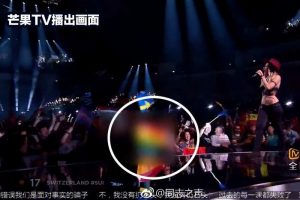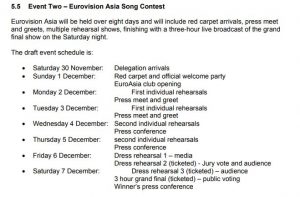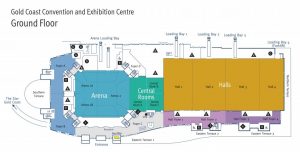Fans in Australia and across the world have spent the last week in a whirl with ‘rumours’ of the imminent arrival of the Eurovision Asia Song Contest. The long-awaited format for the region has gone through numerous bumps in the past decade, including attempts by German entrepreneur Andreas Gerlach dating back to 2009 which went through numerous naming issues to host city rights, to the contract with Blink TV and Australian broadcaster SBS announced in March 2016 which has since faced issues regarding broadcast partners in the Asian continent delaying its launch.
At the start of October 2018, outgoing Managing Director Michael Ebeid for Australian broadcaster SBS commented that organising the Asian contest was proving “too geo-politically difficult”, with the Australian broadcaster seemingly putting the idea on the back-burner to focus foremost on its newly launched national final for the Eurovision Song Contest.
Broadcaster Issues in Asia
It is understood that one of the biggest issues at play is that of China’s participation, with the nation now having a strict curb on imported TV shows and formats by the country’s central media regulator. A directive was established in late 2016 to focus on original domestic programs, and channels are no longer able to air remakes of popular international reality shows. Additional restrictions also exist in regards to the number of international formats allowed into the Chinese market, with a rule that it air no more than two foreign or foreign adapted programs during primetime each year – restricted further in that only one of those can be new.
The rule was brought into play to assert Chinese culture and values, which “convey the Chinese Dream, core socialist values, patriotism and Chinese traditions” according to the statement issued by China’s State Administration of Press, Publication, Radio, Film and Television. Taking this into account, alongside the issues where the Chinese broadcaster Mango TV saw fit to edit the 2018 Eurovision Song Contest removing elements such as Irelands’ performance due to the LGBTQI themes and the tattoos of the performers for Albania and Switzerland, it becomes clear that any participation in a Eurovision Asia format for China – Asia’s biggest market – is difficult and unlikely at this point.

Mango TV Screenshot source: ABC
China would not be the only country however that may have issues with a format that has such strong ties to the LGBTQI community and espouses values such as freedom of expression. Whilst the Song Contest is considered apolitical, messages such as ‘building bridges’ and ‘come together’ might not be welcome between nations that have long-held deep divides. Issues like ownership over South China Sea, threats of retaliation between China and Japan, Taiwan and Hong Kong’s self-governance, and local political instability and religious tolerance in many more nations across the region, are likely to play behind the scenes and out on the stage just as much as we have seen between Russia and Ukraine, or Armenia and Azerbaijan.
We’re all going on a Gold Coast Holiday?
Whilst the broadcaster and the format owner company Blink TV officially remain ‘tight-lipped’ over the Asian Contest for now, the fact that a report now exists and is openly available online, shows that the event is not as much on the backburner as was thought.
What we can garner from the release of the recent information is that, over the course of the past year and as recently as this September, the production company have made proposals to a number of cities within Australia to host not only the Asian contest, but the first Eurovision National Final. Cities in play have included at least Sydney, Melbourne, and the Gold Coast.
The announcement of Gold Coast’s success in winning the opportunity to host the National Final last month however took many by surprise. Sydney’s location as the home of SBS TV broadcasting and Melbourne’s status as the cultural capital with its large European population, would have proven hard to steer away from. But when assessing in greater detail, and with the further knowledge of an Asian contest also being part of the package, it begins to make more sense.
Both Melbourne and Sydney are currently experiencing significant issues with mobility due to transportation development – Melbourne CBD with its new Metro project, and Sydney’s consistently delayed light rail closing the main streets of the city. Additionally, Sydney is already suffering shortages in hotel rooms with development not keeping up with tourism demands, making it difficult for the city to secure major international events. Both locations have ample suitable venues where a television production can be held as well as being the right size, but the costs associated with their hire for a 3-4 week period in which to get it to a ready state, would likely far outweigh the benefits. Essentially, places like the Opera House would make an impact on international broadcast, but financially for the venue, it would make more sense to take one-night only or season-long events.
Gold Coast on the other hand has already undergone its development for international tourism readiness with the hosting of the 2018 Commonwealth Games. Its venues, public transportation, roads and hotel supply are at a high standard, and the City Council with its recent major event experience, would be primed to handle such a program and its associated elements both in logistics and promotion.
Additionally, the city has its own international airport which is a destination point for 3 major discount carriers flying in from Asia – Air Asia from Malaysia, Scoot from Singapore, and Jetstar from Japan. This capacity is boosted by Brisbane airport, just one hour’s drive away, with its dozens of connecting carriers such as Thai Airways, Garada Indonesia and Cathay Pacific from Hong Kong.
Whilst the Chinese market is the number one source of visitors for the region (contributing over AU$1 billion to the economy in 2017), it is also popular tourist location as well for Koreans and Japanese, seeking out sunny beaches and shopping. Despite six Asian nations featuring in the top ten source markets for visitation, the Queensland Tourism Board has long been trying to increase these numbers (currently sitting at attracting 25 percent of the total of international visitors, according to Travel Research Australia), in line with the interest experienced by its Southern counterparts in New South Wales and Victoria. Hosting an event such as this will be a great opportunity for marketing its image across Asia, alongside potentially hosting famous Asian artists such as BTS through the event which would encourage international travellers to attend.
What’s Possible?
The Gold Coast City Council report from September 2018 also gives great detail as to what we can likely expect of a Eurovision Asia launch.

Schedule as published in Gold Coast City Council September 2018 minutes
Looking beyond the timeline, it indicates that there will be (up to) 16 participants, that the event will mirror much of the Eurovision format and play out over the course of a week with 2 individual rehearsals, 3 dress rehearsals – two of which will be ticketed for public, one of which will be a jury final where 50% of the vote will be determined – and a final that involves public voting. It also outlines details for an opening party, a location for public parties throughout the week, support for the fan hosted events and the Euroclub for artists in the evenings. The dates noted in the report for ‘Eurovision Asia’ week to occur are 30 November to 7 December 2019.
The report also details that the Contest hosting is likely to take place in the Gold Coast on a 4-yearly rotational basis, thus indicating that it will not necessarily be a winners’ right to host the following year. The report specifies that the Gold Coast partnership will be play for 12 years, therefore allowing them the chance to host a total of 3 times. The other 3 countries/host cities are not listed, and therefore no indication of the other major broadcast partners involved or the participating nations are known.
We must however keep in mind that the arrangements detailed would have been part of a large proposal put to them by Blink TV for consideration, and in no way represents a ‘done deal’. Don’t go booking your travel arrangements just yet!
The elements published instead represent what is required, a possible timeline and what it aims to achieve should it proceed. Gold Coast Council have essentially given the ‘green light’ for it to occur in its Gold Coast Convention Centre and other precincts, and thus the Asian contest has secured some long-term commitment from the Council to promote and host in their backyard. An important step, but there are more steps in the journey.
What Do We Actually Know?
Nonetheless, we are certain that the first-ever National Final for Australia will be hosting in the same location on 9th February 2019.
‘Australia Decides‘ already launched its call for song submissions in mid-October, and closed over last weekend on the 4th November. We understand that hundreds of entries have been received in a variety of genres, including some from high profile songwriters. From this, a shortlist of 20 will now be drawn up and matched with high-profile Australian artists.
Whilst no names have been announced, according to the Gold Coast report the aim is for local artists such as Delta Goodrem, Ricki-Lee Coulter and Peking Duk to be secured. The final number of entries to be produced and performed at the national final will be approximately 10-12 songs and these shall be released to the public before the Contest. The winner is to be determined from a mix of jury voting (at the dress rehearsal on Friday 8th February) and public voting at the National Final hosted by the current Eurovision commentary team of Double J radio broadcaster Myf Warhurst and comedian Joel Creasey. The winning song and artist will then go on to represent Australia at Eurovision 2019 in Tel Aviv.
Hosting the National Final event will essentially serve as a perfect testing ground for the production team and broadcaster to get ready for an even bigger opportunity should it come to fruition.
The Gold Coast Convention and Exhibition Centre, located in the heart of the beachside region, is located on the major highway and connected by both regular bus and light rail services. It is surrounded by hundreds of hotels and apartments, close to shopping centres and a short walking distance to the Star Casino which serves as a major entertainment hub which could prove irresistible as a Euroclub (Asiaclub?) location giving its 24-hour licencing as well as serving as a delegation hotel.

Floor map. Source: GCCEC website
The venue itself has opportunities for arena-style seating with a capacity of up to 6000 people. With staging in place, this is more likely to be reduced to between 4000-5000 seats. The location has already hosted a number of other large scale music events such as Pink, Rihanna and Kings of Leon, and given i’s build, it has the roof and floor capability to weight-bear the necessary lighting and film equipment to produce a high-quality TV production just as we have seen at the Eurovision Song Contest.
It also has a 1400 car parking space in which outside broadcast facilities can be located, a ground floor loading dock ready for delivery of production elements, and large space for a press centre and dressing rooms, as well as onsite catering.
Ultimately, we can see that Australia is taking its role in Eurovision involvement and its expansion in the Southern Hemisphere very seriously. Clearly they have noted all the lessons of optimal production elements of shows like Melodifestivalen, requirements for venues, expectations for both participants and fans, and have found a natural home for them to be delivered in Queenland; a place where hopefully it’s beautiful for the National Final and perfect for the next chapter of this Eurovision story.









